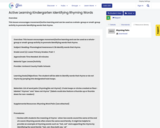
This lesson encourages movement/active learning and can be used as a whole-group or small-group activity to promote identifying words that rhyme.
- Subject:
- Reading
- Material Type:
- Lesson Plan
- Author:
- Ruth Matheny
- Date Added:
- 05/19/2022

This lesson encourages movement/active learning and can be used as a whole-group or small-group activity to promote identifying words that rhyme.
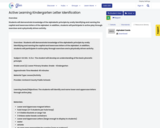
Students will demonstrate knowledge of the alphabetic principle by orally identifying and naming the capital and lowercase letters of the alphabet. In addition, students will participate in active play through exercises and a physically driven activity.
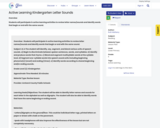
Students will participate in active learning activities to review letter names/sounds and identify words that begin or end with the same sound.
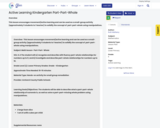
This lesson encourages movement/active learning and can be used as a small-group activity (approximately 5 students to 1 teacher) to solidify the concept of part-part-whole using manipulatives.
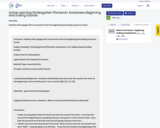
Students will engage with movement to hear the beginning and ending sounds in words.

Set up a 4 corners activity.. Hand out shape pattern cards to all students. For 30 seconds each corner does an exercise corresponding to their first shape, then they will change depending on their second, third, and fourth shape... then they switch through the circuit until they have completed their pattern. They will go through the pattern 2 times.

Students will write on a predetermined topic. , the students will need some words to help build sentences. The beach ball will have words or phrases written on it that will help the students such as: I love my pet___________(cat, dog, fish, etc. ) I like to play _______________(game) _ with my pet. I feed my pet__ _____________.

Cards from each category will be placed throughout the room on tables or desks. Students will pick up 3 cards each and try to find another student or students to combine their word part with to create a new word. New words formed will be recorded on a sheet and shared with the class as a pair and share at the end of the lesson.
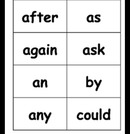
Put letters or sight words in various places on the sidewalk with chalk in the recess area. This lesson allows for differentiation among reading levels. You may also make laminate cards to use. Have students move quickly to the section of the sidewalk in which the letter you give them appears. Every child should have their own letter to find.
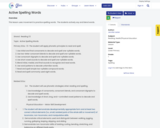
This lesson uses movement to practice spelling words. The students actively say and blend words.
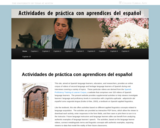
Actividades de práctica con aprendices del español is an online corpus of videos of second language and heritage language learners of Spanish during oral interviews and provides supplemental activities to help viewers investigate learners’ language and proficiency levels.
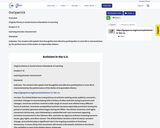
Virginia History & Social Science Standards of LearningGrades 9-12Learning Domain: GovernmentStandard:Indicator: The student will explain that thoughtful and effective participation in civic life is characterized by the performance of the duties of responsible citizens.
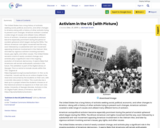
The United States has a long history of activists seeking social, political, economic, and other changes to America along with a history of other activists trying to prevent such changes. American activism covered a wide range of causes and utilized many different forms of activism. American sociopolitical activism became especially prominent during the period of societal upheaval which began during the 1950s. The African American civil rights movement led the way, soon followed by a substantial anti-war movement opposing American involvement in the Vietnam War, and later by vigorous activism involving women's issues, gay rights, and other causes. The United States remains a land of nearly constant change, and activists play a significant role in the ongoing evolution of American democracy. It seems likely that Americans will remain enthusiastic activists in the future. This exhibition is part of the Digital Library of Georgia.
This is a remix to include visuals within the TOC. Original at https://goopenva.org/courses/activism-in-the-us
As a teacher, I would use this as an online chapter to be read and consumed by the students on their own, with a socratic discussion to follow. This could also be a lead up to a project where the students choose on of the historical activism to expand on in their own civic duties.
University of Georgia Libraries. Activism in the US. Digital Public Library of America. April 2013. https://dp.la/exhibitions/activism.

Over 20 different activity sheets that school counselors can use when working with students that align with theories (ACT, CBT, SFBC, and MI).

This resource contains a link to a youtube video titled "The Digital Divide, Explained" along with questions for students to respond to after they view the video.
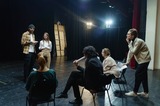
A clear outline for student expectations during rehearsals, class, tech week, and/or production days.Keep them focused and accountable and modify to fit the needs of your program.Can be used for class syllabus or after school/in class productions.
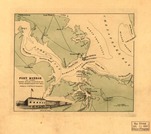
In this learning experience, the students will analyze multiple primary source documents as well as secondary information sources to understand this watershed event in Virginia and US History. The three men who will be studied in this experience ran away from their slave-holding captors and made their way to Fort Monroe. Upon arrival, military leadership at the fort claimed that the run-aways were enemy contraband and therefore could be confiscated by the Union forces. They were declared free through this war-time loophole and when the news spread, many other African Americans would soon start coming to Fort Monroe to claim their freedom as well. Students begin by examining the records of enslaved people who ran away “to the enemy” (Union forces). Finally, students will use a Cost/Benefit analysis chart to guide their analysis of secondary information sources and develop an understanding of the concepts of resistance and a working knowledge of the event of Mallory, Baker, and Townsend sparking one of the first blows to the system of slavery.
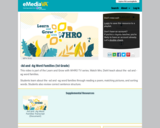
This video is part of the Learn and Grow with WHRO TV series. Watch Mrs. Diehl teach about the -ad and -ag word families.
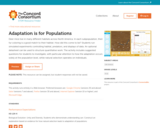
Deer mice live in many different habitats across North America. In each subpopulation, their fur coloring is a good match to their habitat. How did this come to be? Students run simulated experiments controlling habitat, predators, and displays of data. An optional datasheet can be used to structure quantitative work. The activity includes suggested questions for students to investigate, with particular attention to how the adaptation occurs solely at the population level, while natural selection operates on individuals.
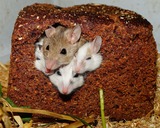
The series of lessons allows students to review the concepts of mutations, adaptations and natural selection by studying a population of pocket mice through a video clip and then applying their knowledge through a simulation game.